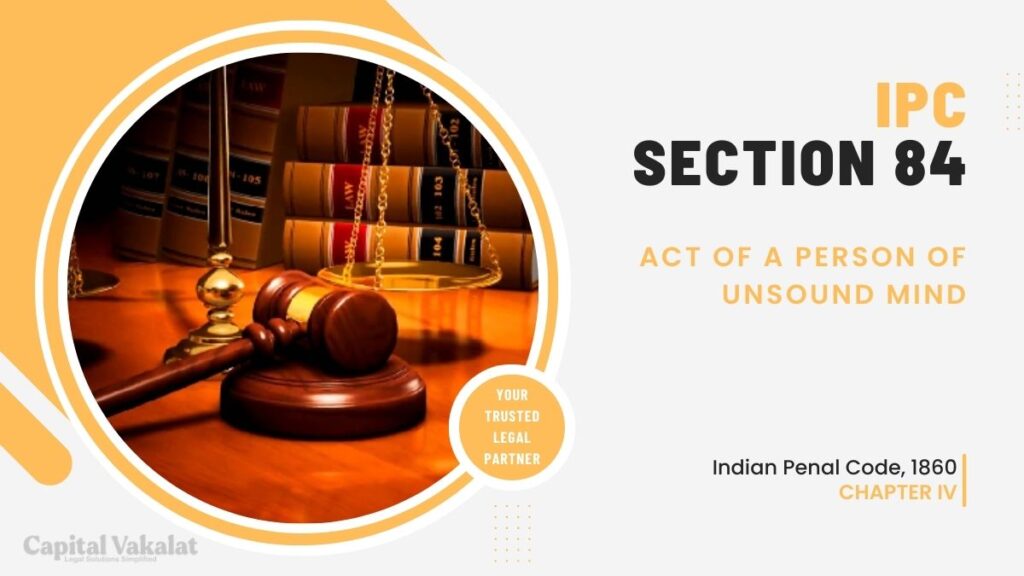In the complex realm of legalities, Section 84 of the Indian Penal Code (IPC) holds a distinctive place. It deals with the actions of individuals who are considered to be of unsound mind when they commit certain acts that would otherwise be considered offenses.

This article will delve into the intricacies of Section 84 IPC, shedding light on its provisions, interpretations, and implications in the Indian legal system.
Introduction to Section 84 IPC
Section 84 of the IPC is a provision that offers a unique defense to individuals who can establish that, at the time of committing an act, they were of unsound mind and, therefore, incapable of understanding the nature and consequences of their actions. This section is based on the fundamental principle that criminal liability should not be imposed on someone who lacks the mental capacity to comprehend their actions.
Elements of Section 84 IPC
To comprehend the applicability of Section 84 IPC, it is essential to understand its key elements:
Unsound Mind
The cornerstone of Section 84 is the presence of unsoundness of mind. This term includes a wide range of mental illnesses and disorders, such as schizophrenia, bipolar disorder, and severe depression. The crucial question is whether the accused was in such a mental state that they could not understand the wrongfulness of their actions.
Lack of Understanding
The second element pertains to the accused’s inability to understand the nature and consequences of their actions. It is not sufficient merely to establish a mental disorder; the accused must prove that they were incapable of comprehending the wrongful nature of what they did.
Causal Link
Section 84 requires a causal link between the unsoundness of mind and the commission of the act. In other words, the accused must demonstrate that their mental condition directly led to the commission of the offense.
Legal Interpretations
Over the years, the courts in India have provided various interpretations of Section 84 IPC, emphasizing the need for a comprehensive assessment of the accused’s mental state. The key principles that emerge from these interpretations include:
Burden of Proof
The burden of proving that the accused was of unsound mind at the time of the offense rests on the accused. They must establish this fact to the satisfaction of the court.
Degree of Mental Illness
The courts have clarified that it is not necessary for the accused to prove complete insanity. Even a partial incapacity to understand the nature of the act can invoke Section 84.
Preponderance of Evidence
The courts rely on the preponderance of evidence to determine whether the accused’s mental condition influenced the commission of the offense. This involves a thorough examination of medical and expert opinions.
Implications of Section 84 IPC
Section 84 IPC serves as a vital safeguard for individuals with mental illnesses. It ensures that they are not subjected to criminal liability when they are genuinely incapable of comprehending the consequences of their actions. However, this provision does not provide blanket immunity. The accused must meet specific criteria, and the court’s decision depends on a case-by-case analysis.
Conclusion
In conclusion, Section 84 IPC addresses the delicate issue of criminal liability concerning individuals with mental illnesses. It embodies a humane approach to justice, acknowledging that those who lack the capacity to understand the consequences of their actions should not be held criminally responsible. However, it is crucial to remember that this provision is not a loophole but a legal safeguard that demands a rigorous assessment of the accused’s mental state.
FAQs
What evidence is required to prove unsoundness of mind under Section 84 IPC?
Evidence typically includes medical reports, expert opinions, and witness testimonies that support the accused’s mental state at the time of the offense.
Can someone feign insanity to escape criminal liability under Section 84 IPC?
It is challenging to feign insanity successfully, as the court conducts a thorough evaluation of the accused’s mental state. False claims are likely to be exposed.
Are there any legal precedents that illustrate the application of Section 84 IPC?
Yes, there are several legal cases where Section 84 IPC has been invoked and interpreted by the courts to determine criminal liability.